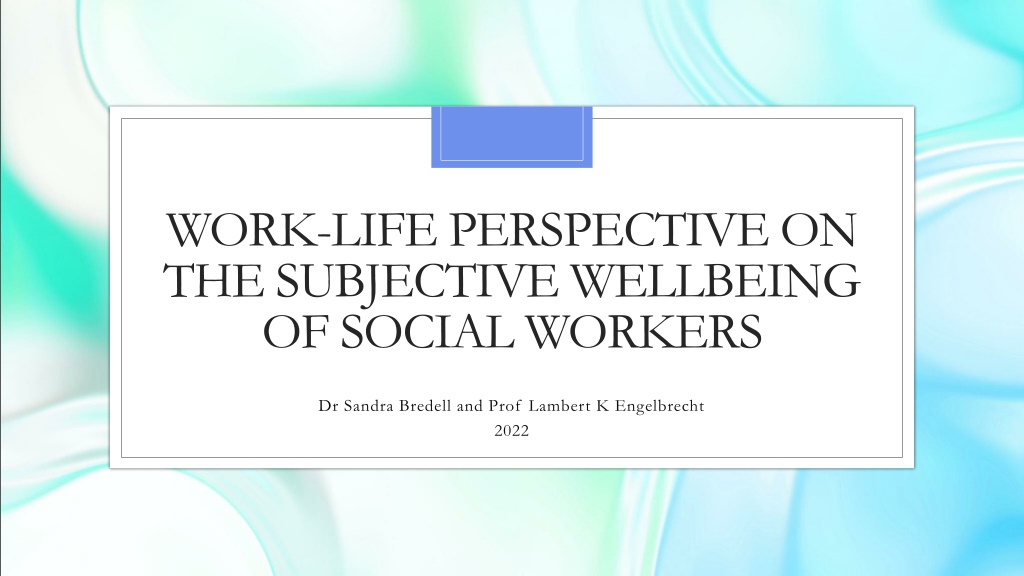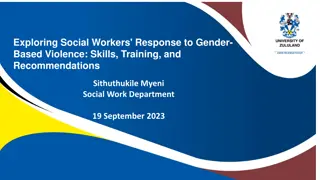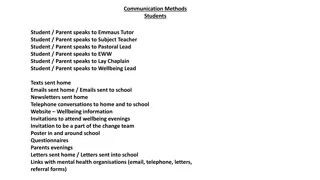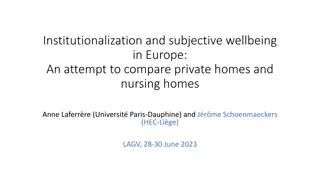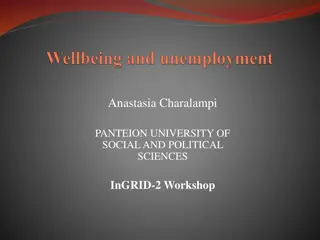Understanding Subjective Wellbeing of Social Workers in South Africa
Gain insights into the subjective wellbeing of social workers in South Africa within the context of work-life balance. Explore perceptions of work-life balance and subjective wellbeing, aiming to provide recommendations for improving the overall wellbeing of social workers. The study uses theoretical frameworks such as positive psychology and broaden-and-build theory to analyze dimensions of subjective wellbeing in social work.
Download Presentation

Please find below an Image/Link to download the presentation.
The content on the website is provided AS IS for your information and personal use only. It may not be sold, licensed, or shared on other websites without obtaining consent from the author. Download presentation by click this link. If you encounter any issues during the download, it is possible that the publisher has removed the file from their server.
E N D
Presentation Transcript
WORK-LIFE PERSPECTIVE ON THE SUBJECTIVE WELLBEING OF SOCIAL WORKERS Dr Sandra Bredell and Prof Lambert K Engelbrecht 2022
PURPOSE OF THE STUDY The purpose of this study was to gain an understanding of the subjective wellbeing of social workers within a work-life context, in light of the implementation of the Recruitment and Retention Strategy for Social Workers in 2009 in South Africa, as social work is still known for its high turnover.
RESEARCH QUESTIONS How do social workers perceive their work-life balance? How do social workers reflect on their subjective wellbeing?
To examine the nature of social work in the South African context. To conceptualise a work-life perspective of social work within the South African context. To describe and analyse the dimensions of social workers subjective wellbeing based on a work-life perspective. To empirically investigate how social workers perceive their work-life balance and their subjective wellbeing. To draw conclusions recommendations to managers, and policy formulators regarding the work-life and wellbeing of social workers. The objectives and workers, make their social
THEORETICAL POINT OF DEPARTURE Positive psychology Seligman It is also strengthened by the broaden-and-build theory of positive emotions by Fredrickson (2004), which means that subjective wellbeing broadens our vision and builds more effective use of available resources (Veenhoven, 2008). The boundary and border theories also serves as a theoretical framework for this research as it was used to study role conflicts in the work-family domains.
This study draws on Dieners (1984; 2000) theory, which illuminates the positive affect affect as experienced respondents, which linked to the theory of positive Fredrickson (2004) flourishing concept (2011). and negative by turn the are Theoretical departure, in a nutshell in broaden-and-build emotions and by Seligman by the
DEFINITIONS Subjective refers to how people report what they feel. This means listening to Wellbeing refers to happiness but in a more medical context. what they have to say. Subjective wellbeing can generally be defined as how people evaluate their lives (Diener & Scollen, 2003:404) which relates to Seligman s (2011) flourishing concept.
DEFINITIONS It is evident from the literature that subjective wellbeing is linked to the positive psychology theory (Diener & Scollen, 2003; Peng et al., 2011; Seligman, 2011). Work-family balance means satisfaction and good functioning at work and at home, with a minimum of role conflict (Clark, 2000:751). The term work-life seems to be more comprehensive and is therefore used in this study.
RESEARCH METHODOLOGY Research approach: Qualitative research Research design: The exploratory and descriptive research design was applicable to this study Population and sampling: Purposive sampling. Participants who met the inclusion criteria were chosen from a professional network and participated in their personal capacity. 11 frontline social workers and 12 managers/supervisors were interviewed by myself, with the social workers having at least 18 months' work experience and the supervisors, 2 years.
CONCLUSIONS It is evident that frontline social workers experience very stressful situations on a day-to-day basis. Factors that contribute to these stressful circumstances were pointed out to be a lack of emotional support, insufficient supervision and support, a lack of resources, poor salaries, and a paucity of development and decision making within the workplace. On the home front, financial concerns, a lack of understanding of work circumstances, different roles in the work and family life, and the quality of relationships were mentioned as having an impact on family life. Aggravating these influential factors was the COVID-19 pandemic that resulted in an extremely uncertain and stressful lockdown period.
CONCLUSIONS With regard to the deprofessionalisation of the profession, the poor recognition of social work was highlighted and that the participants felt that social workers needed to be more active in advocating for the profession and what it stands for and clearing the misconceptions that still exist around the profession. The participants felt firmly about the fact that it requires people with a certain type of personality to become social workers and that the qualification should be a screening degree.
CONCLUSIONS There also seemed to be a lack of organisational commitment regarding resources on the one hand and supportive working conditions such as flexible working hours on the other. If supportive working conditions are in place, it seems to convey to the employees that the organisation cares about them and they then experience a feeling of belonging, which reduces the intention to leave their jobs. available and reliable
Context of social work in South Africa: With regards to supervision, that a supervisor should not have more than 10 supervisees, that RECOMMENDATIONS supervision s main functions should be split equally between the administrative, supportive, and educational components and lastly that young frontline social workers are offered more supervision time and guidance, especially during their first two years of employment.
Regrading salaries, as part of the Recruitment and Retention Strategy for Social Workers, needs to be rolled out specifically to bring the salaries of social workers employed by Welfare RECOMMENDATIONS Agencies up to par by the South African Council for Social Services Professions in South Africa, and taking a firmer stand to advocate for the profession and standardise a supervisor course to ensure that supervisors are equipped with the necessary skills.
Work-life balance/perspective: Social workers need to take the responsibility for flourishing at work. Social workers will have to enforce the boundaries that they set in place, in order to survive the demanding social worker profession. RECOMMENDATIONS Supervisors: attention must be paid to all aspects of social work, as well as the importance of boundaries, work-life balance, and self-care. Organisations: a proper orientation programme should be followed; a detailed description of the role and job requirements must be provided, and resources should be provided for the job to be done.
wellbeing: Although the Subjective responsibility for self-care lies with the social workers, they need supervisors, organisations, African Council for Social Service Professions support their efforts. to know and that the their South RECOMMENDATIONS Time should be allocated during supervision sessions to address workers skills, boundaries, personality attributes turnover of social workers, as well as to ensure healthy social workers effectively to their clients. the frontline needs, combat social and high to the rendering services
Management needs to buy in on the concept of self-care programmes, flexible working hours appreciation and support to the workforce. wellness to days, show and their Wellness frontline social workers (in the first two years of employment) should be registered with the South African Council for Service Professions, in the same way as courses are registered for Continuing Professional Development points, for example, 15 points development and 5 points towards self-care and wellbeing. programmes and orientation for RECOMMENDATIONS for professional
The government should make the decision to support these endeavours by obligating organisations to play their RECOMMENDATIONS part, but also to intervene and provide for better salaries and working conditions for social workers.
The figure on the next slide shows the eight dimensions of wellness CONCEPTUAL FRAMEWORK encapsulating the work-life balance and subjective wellbeing: Conceptual framework (Bredell, 2022:96)
IN CONCLUSION In summary, most of the social worker participants were thinking of either leaving their jobs or the profession, with the majority being employed in their current job for less than five years. It showed that a high turnover of social workers still exists despite the Recruitment and Retention Strategy for Social Workers being implemented.
IN CONCLUSION The social worker participants admitted to feeling stressed and overworked, and also highlighted inadequate supervisory support. With regard to work-life balance, the participants echoed that there is a spillover from the work to the family domain and vice versa, which underlines the importance of adhering to boundaries that impact on their holistic wellness and maintaining self-care.
REFERENCES Bredell, S. 2022. A work-life perspective on the subjective wellbeing of social workers. Doctoral dissertation, Stellenbosch University. Clark, S.C. 2000. Work/family border theory: a new theory of work/family balance. Human Relations, 53(6):747-770. Diener, D. & Scollen, C.N. 2003. The evolving concept on subjective wellbeing: multifaceted nature of happiness. Advances in Cell Aging and Gerontology, 15:187-219. Diener, E. 1984. Subjective well-being. Psychology Bulletin, 95:542-575. Diener, E. 2000. Subjective well-being: the science of happiness and a proposal for a national index. American Psychologist, 55:34-43. Fredrickson, B.L. 2004. The broaden-and-build theory of positive emotions. Philosophical Transactions: Biological Sciences, 359(1449):1367-1377. doi:10.1098/rstb.2004.1512.
REFERENCES Peng, A., Ilies, R. & Dimotakis, N. 2011. Work-family balance, role integration and employee well-being. In: Kaiser, S., Ringlstetter, M.J., Eikhof, D.R. & Pina e Cunha, M. (eds.). Creating balance? International perspectives on the work-life integration of professionals. Berlin: Springer-Verlag: 121-140. Seligman, M.E.P. 2011. Flourish: a visionary new understanding of happiness and wellbeing. Australia: Random House. Veenhoven, R. 2008. Sociological theories of subjective well-being. In: Eid, M. & Larsen, R. (eds.). The science of subjective well-being: a tribute to Ed Diener. New York: Guilford Publications: 44-61.
